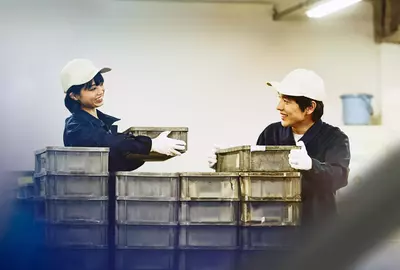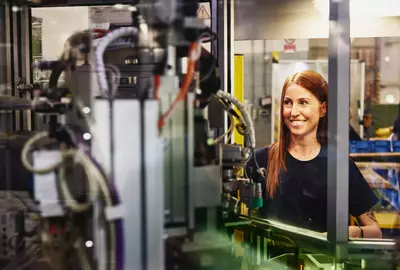The manufacturing industry is on the verge of unprecedented change. As Industry 4.0 changes how goods are produced, the new trend towards reshoring will change where production happens. From automation and AI to the rise of sustainable practices, these changes are not only reshaping production, but redefining workforce requirements.
In this environment, progress will depend on skilled professionals – and new hiring strategies to attract and grow a workforce ready for the next generation of manufacturing. Below, we’ll explore the top trends in advanced manufacturing technology, and insights into the hiring practices that can help organizations stay competitive.
the top trends in advanced manufacturing technology.
Understanding the trends shaping the future of manufacturing is mission-critical, particularly as new government investments create opportunities for manufacturers in the US and Canada.
Early adopters of advanced manufacturing technology stand to see a 122 percent increase in cash flow. For slow adopters, the picture is the opposite: they may be outpaced by more competitive peers that deploy advanced technology on production lines.
However, adapting to the future of manufacturing technology will also mean preparing workforces for the shift. These trends will not only transform production processes, but also redefine the skills that forward-thinking employers will need to watch out for.
1. automation and robotics.
Robotic systems have been a staple of manufacturing for over 50 years. Today, even fully autonomous factories are old news – but as McKinsey notes, enterprises are still only at the beginning of the adoption curve. As automation and robotics advances, robots will become capable of more sophisticated tasks and decision-making.
This will drive demand for a workforce with robotics programming, maintenance, and integration skills. Rather than placing physical demands on workers, advanced manufacturing technology will require workers to oversee robotics to ensure production lines stay safe and efficient.
2. additive manufacturing (3D printing).
No longer a nascent technology, 3D printing is making inroads in industries like healthcare, automotive, and aerospace. Its ability to produce bespoke products and parts at scale is creating unprecedented opportunities for innovation. For example, NASA recently used 3D printing to develop a new alloy which can withstand greater temperatures and lasts over 1,000 times longer than existing materials.
As 3D printing expands to new industrial processes, there will be an increasing need for engineers and designers proficient in CAD software and 3D printing technologies. This goes hand in hand with specialized knowledge of sustainable materials and advanced polymers.
3. artificial intelligence and machine learning.
AI and machine learning are becoming increasingly important for manufacturing, since they have the potential to reduce production timelines by 10x. AI can also help factories become more adaptive: 51 percent of AI deployments in manufacturing are focused on smart production with real-time, predictive maintenance, data tracking, and energy optimization.
Data analysts, AI specialists, and machine learning engineers will be critical for sustaining the future of AI-enabled manufacturing. As AI makes leading-edge manufacturers more competitive, the labor market for AI skills will become more competitive as well.
4. industrial internet of things (IIoT)
IoT integrates operational technology with information technology to streamline manufacturing processes. As network connectivity advances to 5G, satellite technology, and beyond, it will enable even seamless integration between all the machines, devices, software, and robotics involved in production.
Production engineers will be at the forefront of these innovations, making sure IIoT processes are designed and implemented effectively. Maintaining this connectivity will require IT specialists, network engineers, and cybersecurity professionals who can optimize networks for AI-enabled IIoT and prevent security disruptions.
5. sustainable manufacturing practices
Environmental and social governance (ESG) is no longer an option – in Canada and the US, new ESG regulations are requiring businesses to reduce their carbon footprints. That goes beyond just sustainable physical processes: over the next few years, an estimated 30% of global enterprises will create software sustainability requirements as well.
As software enables real-time energy monitoring and waste reduction, sustainability officers and experts in energy-efficient systems will be in high demand. These roles blend environmental science with technology to scale environmentally friendly practices.
Overall, advanced manufacturing technology will come with significant implications for the workforce. As technology redefines production processes, businesses must rethink how they approach hiring and developing the human talent that technology relies on.
Download our comprehensive guide to discover top manufacturing hiring trends and align your talent strategy with your business growth objectives.
download the guidewhat these trends mean for hiring.
By 2030, 2.1 million manufacturing jobs may go unfilled due to a skills shortage. As automation moves humans farther away from production lines, the market for specialized talent will get more competitive.
That’s especially true as the manufacturing workforce continues to age and retire. Creating a strong talent pipeline will require hiring strategies such as partnerships with educational institutions and skills-based approaches that target a new generation of manufacturing workers.
To attract the right talent, employers should also consider how worker expectations have changed since the pandemic:
- Salaries for many in-demand positions have increased, and talent will expect competitive compensation packages with a range of benefits.
- The demand for flexible and remote shifts isn’t limited to office workers. It’s worth evaluating whether you can offer flex time, part-time work, or even remote work in some cases.
- Workers want professional development opportunities, especially as the market shifts.
Employers need to address manufacturing’s perception problem as well. It’s often considered hard, low-paying work simply because that’s what it has been in the past. Job postings should emphasize how the evolution of production lines is shaping new opportunities for workers to embark on exciting careers in the sector.
Along with attracting new talent, employers should consider what opportunities they can offer to their current workforce.
Upskilling and reskilling opportunities can save on hiring and training costs, and boost employee retention and engagement. 70% of manufacturers have already launched internal training programs, and 75% report enhanced productivity and better opportunities for employees as a result.
Finally, diversity remains a significant issue in manufacturing. In both Canada and the US, women make up approximately 30% of the manufacturing workforce. Creating opportunities for women and minorities to thrive in manufacturing can unlock a new talent pool.
how we can help.
Advanced manufacturing technology isn’t just creating new complexity on production lines. It’s also making hiring more complex as well. Finding the right talent requires expertise on the market and the best approaches to tap into the talent that will shape the future of the sector.
Our team specializes in connecting businesses with skilled professionals who align with your strategic goals. From smart hiring strategies to skills-based approaches, we can help you speed up the hiring process, hire more diverse workforces, and improve the candidate experience. We also provide insights into salary benchmarks, workforce planning, and upskilling strategies tailored to your needs.
looking towards the future.
The future of advanced manufacturing is here, and the right talent can drive your business forward. Understanding how advanced manufacturing technology will shape the future of your business will help you adapt your hiring approach to the production lines of tomorrow.
Contact us today to learn how we can support your talent acquisition efforts and help your organization thrive in the age of advanced manufacturing.






